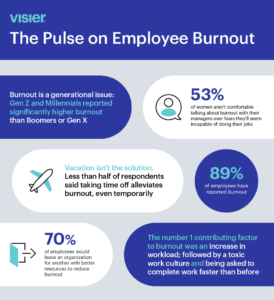The employee experience is constantly evolving. As the years go by, employers are starting to understand what their employees need and want from their experience at work. And as we move closer to 2023, there are a few things that we can expect to see change in the employee experience.
The COVID-19 pandemic has redefined the employee experience. In 2023, the modern employee experience will be a hybrid of in-person and remote work, focusing on inclusion and belonging.
Employee experience is a top priority for businesses today. To stay competitive, companies must invest in their employees and provide them with an experience that meets their needs and expectations. However, with the current economic climate, many businesses are forced to re-evaluate their budgets and cut costs wherever possible. So in the face of opposing employee expectations and business needs, the question becomes, what will the modern employee experience look like in 2023?
Business confidence is critical
In today’s economy, confidence is key. Employees want to work for a company that is stable and successful. They want to know that their job is secure and that they can advance within the company. Businesses must show their employees that they are confident in the company’s future and committed to its success.
Business confidence is critical because it directly impacts employee experience. Employees who feel confident in their company’s future are more engaged and productive. They are also more likely to stay with the company for the long term. Additionally, business confidence influences employers’ perceptions of the workplace experience.
If employers believe that their workplace is stable and successful, they are more likely to invest in employee experience initiatives such as digital employee experience platforms. Ultimately, business confidence is essential for attracting and retaining top talent.
Employees also need to know that they are good at their jobs and that their contributions are valued to feel confident in their work. Unfortunately, many companies need to focus on building confidence in their employees. This will start to change in 2023 as more and more companies realise that confidence is critical to business success.
In 2023, employee confidence will be a key focus for many businesses. Recognising accomplishments and contributions is essential for building confidence in employees, who will be more likely to take risks and drive innovation. This shift will be driven partly by the increasing importance of the employee experience, as organisations recognise that happy, confident employees are critical to success.
One employee survey in 2022, which questioned employee recognition at 133 different UK companies, found that generation gaps play a key part in the levels of recognition required.
- In fact, 68% of Gen Z employees feel they deserve greater recognition for the work they do.
- The Millennial generation is most likely to feel they deserve greater recognition for their work.
- And Gen X are most likely to leave a company if their work isn’t recognised, with 29% saying they’re currently looking for a new role because of a lack of recognition.
Digital tools and platforms will play a role in providing employees with real-time feedback and recognition for their work. Ultimately, businesses focusing on employee confidence will be better positioned to succeed in the years ahead. Employees who feel confident in their abilities are more likely to take risks, which can lead to breakthroughs and innovation.
Related Reading: Are You Creating Psychological Safety in the Workplace?
Hesitancy to invest in EX
Many businesses are still feeling the effects of the global pandemic, and as a result, some firms have become focused on short-term gains and cost-cutting measures instead of long-term investments. However, recession-focused firms that slow their investments in the employee experience will pay the price in the long run.
A strong employee experience is essential for attracting and retaining top talent, fostering employee engagement, and ensuring that your workforce is productive. The employee experience extends beyond the physical workplace in today’s digital world. It encompasses everything, from how easy it is to access HR information online to whether employees have the tools they need to do their jobs effectively.
By investing in a strong digital employee experience, businesses can set themselves up for success even in challenging times.
As any HR professional knows, employee experience is essential to the success of any organisation. Happy employees are more productive, and a strong employee experience can help to attract and retain the best talent. However, in recent years, many companies have cut back on employee experience initiatives, opting instead to focus on cutting costs.
While this may provide short-term financial gains, it can harm employee morale and productivity in the long run. In 2023, these companies will start to realise that they need to invest in their employees if they want to succeed in the long run. By investing in office-based and digital employee experience solutions, they can create a more efficient and engaging workplace for their employees.
In doing so, they will be able to improve employee morale, increase retention rates, and boost productivity levels. As a result, companies that invest in employee experience will be well-positioned to succeed in the years to come.
Related Reading: 5 Ways to Create a Recession-Proof Workplace
Tackling employee burnout
Throughout the Covid pandemic, employees had to be more agile, faster, and willing to work harder. Employees worked at surge capacity, and many businesses survived thanks to the willingness to go above and beyond.
However, those employees are going to need time and opportunities to recharge. Employees are looking for a more balanced approach to their work and home life. Unfortunately, many organisations are failing to give them that.
To stay competitive, organisations need to re-evaluate their expectations of employees and start supporting a healthy work-life balance. When employees feel supported by their organisation, they are more likely to go above and beyond. Globally, 63% of those who rate their work-life balance highly are willing to go above and beyond for their organisations.
Employee burnout has become a hot topic in recent years, and with good reason. With the rise of the digital age, employees are more connected than ever before – which can lead to longer hours, more work-related stress, and less work/life balance. As a result, organisations must focus on employee experience and creating a workplace that promotes employee well-being.
One way to do this is by ensuring that employees clearly understand their scope of work and avoiding “job creep” — where employees are asked to take on additional tasks outside of their normal roles. By taking steps to prevent employee burnout, organisations can create a more positive workplace culture and improve employee retention.
Burnout has become a real issue in the last few years, as more and more people struggle to balance their work and personal lives. As much as 75% of employees say they have experienced burnout, many instances being specifically during the pandemic. In 2023, we’ll see a continued focus on addressing employee burnout.
Source: Visier
Companies will need to start offering more flexible working arrangements and provide additional support for employees struggling with burnout. Additionally, there will need to be a greater focus on preventative measures, such as teaching employees how to manage stress effectively.
Related Reading: How to Support Work-Life Balance for Employees: The Ultimate Cloudbooking Guide
The importance of shared values
In the past, having a job was simply about earning an income. But today, employment has become much more than that. For many people, their job is a massive part of their identity. It’s a big part of how they see themselves and how they want to be seen by others. Being employed isn’t just about having a job — it’s a core part of a person’s value system.
In 2023, we can expect to see more workers who are actively engaged with their company’s values and mission. There will be a shift away from traditional 9-to-5 jobs and towards opportunities that offer a sense of purpose.
In today’s turbulent political and cultural climate, employees are looking for their business leaders to take action on social issues. They want to see that their company’s words are more than empty rhetoric.
According to Gartner, there is a direct need for a shared purpose. Businesses can create a deeper sense of shared purpose among their employees by taking a stand on important issues. This can lead to increased employee engagement and a better overall workplace experience. Employees want to see their employer taking concrete steps to address the issues that matter to them. And when they do, it can positively impact their overall workplace experience.
Related Reading: Women in Tech: Tackling the Tech Gender Gap
Hybrid is here to stay
Many employers will continue to try to force workers back into the office, upending remote-work lifestyles. The COVID-19 pandemic has led to a mass exodus from cities as workers ditch their expensive downtown apartments for more affordable suburban homes. This trend is likely to continue in 2023.
However, returning to what many business owners and leaders still think of as the status quo could backfire as employees rebel against being forced back into the office after enjoying the flexibility of working from home. In fact, 99% of employees working remotely want to be able to continue doing so.
The rise of remote work has been one of the biggest workplace trends of the past few years. However, a recent report from the Office for National Statistics suggests that as many as 85% of employees in the UK still want a mix of office and home-based future of work. This desire for a hybrid working model reflects a growing awareness of the importance of employee experience.
The pandemic has driven this shift, but it’s not just a temporary change. How we work is changing, and organisations need to adapt to meet the needs of their employees. Our own research backs up these findings. According to Cloudbooking’s Research on the Future of the Workplace, Gen Z employees don’t want to only work from home. They want the connections and mentorship experience of the traditional office.
More than ever, employers need to consider their workers’ needs to determine the best approach to building a hybrid working environment.
One of the key challenges facing organisations is how to create a seamless digital employee experience. With so many employees now working remotely, it’s more important than ever to provide them with the tools and technologies they need to be productive and engaged.
This includes everything from collaboration tools to employee portals and employee self-service systems. By investing in the right digital employee experience solutions, organisations can ensure that their employees have everything they need to succeed — regardless of location.
Another challenge facing organisations is how to create a workplace experience that meets the needs of both office-based and remote employees. Many organisations still struggle to provide a consistent employee experience across multiple locations. This is where employee engagement comes in.
By creating an engaging work experience that supports both office-based and remote employees, organisations can ensure that all employees feel valued and supported — no matter where they work.
Related Reading: How to Write a Hybrid Working Policy: 9 Things to Include
It’s time to rethink the employee experience
The modern employee experience will continue to evolve over the next few years as businesses adapt to the changing needs of their workforce. To stay competitive, companies must create a positive work environment that engages and motivates employees. They can accomplish this by investing in total well-being, providing flexible work options, and investing in modern technologies that streamline processes and improve efficiency.
The COVID-19 pandemic has fundamentally changed the way we think about work. In 2023, these changes will shape the modern employee experience — namely, increased flexibility, inclusion, and belonging. By keeping these trends in mind, employers can create workplaces that meet employees’ evolving needs.
As you can see, the employee experience will continue to evolve in 2023. So, if you’re an employer or you manage a team, start thinking about how you can improve your employees ‘ experiences now so that you’re ahead of the curve.
Cloudbooking’s agile working tools can enhance your workplace experience so that your team gets more from the employee experience. Contact us now for a no-obligation product demo.




